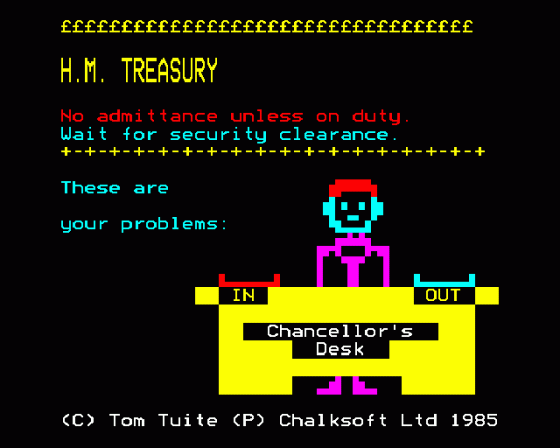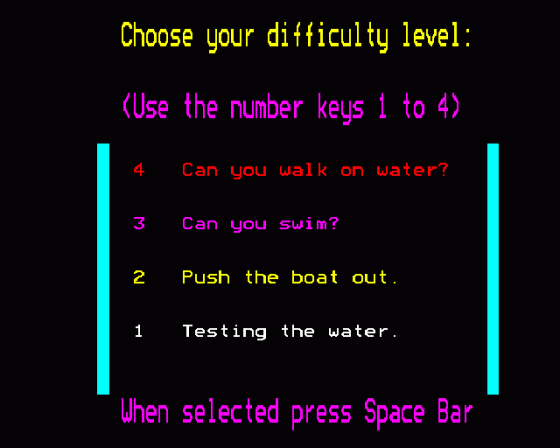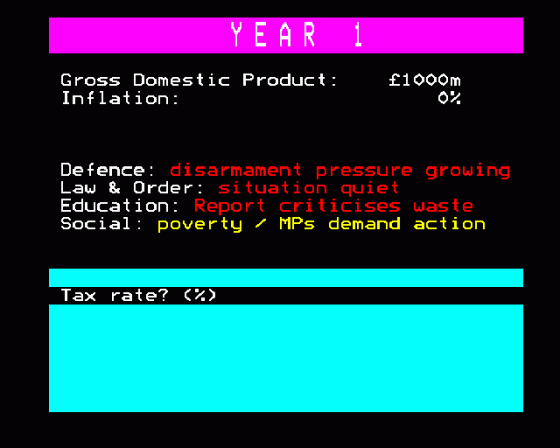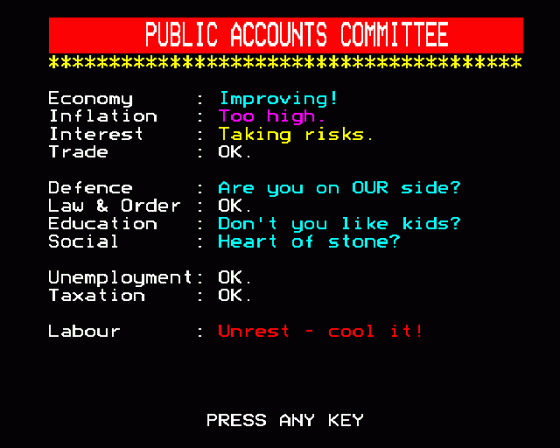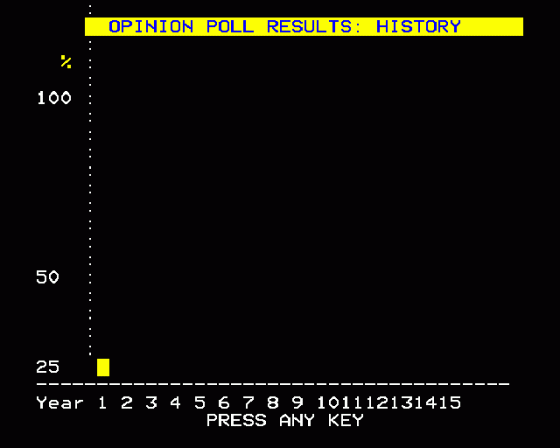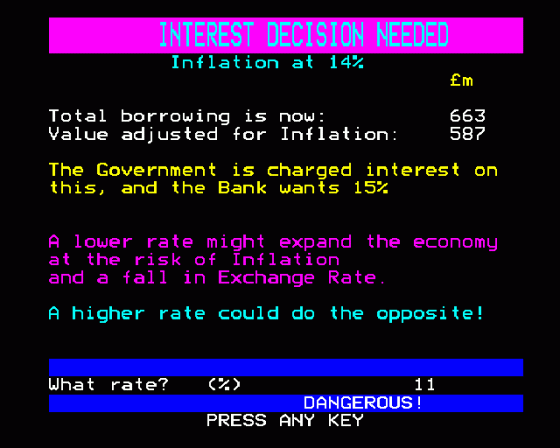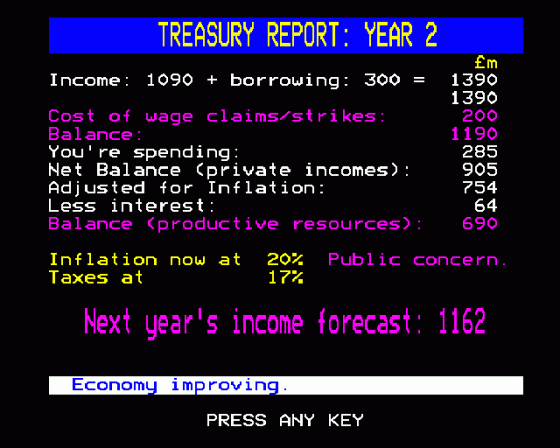
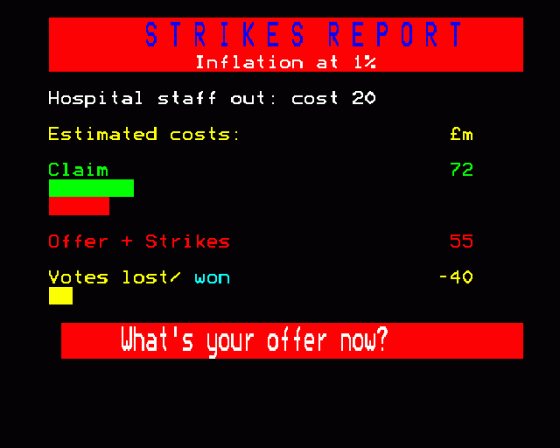
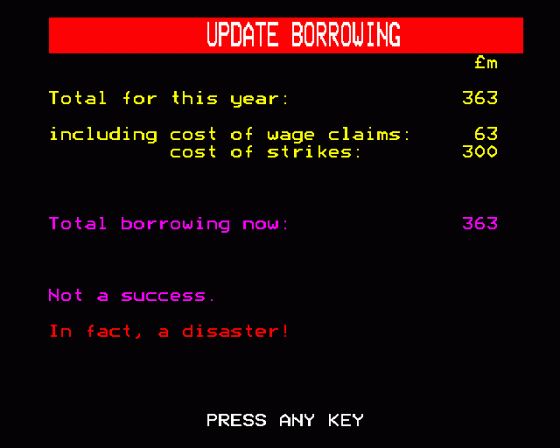

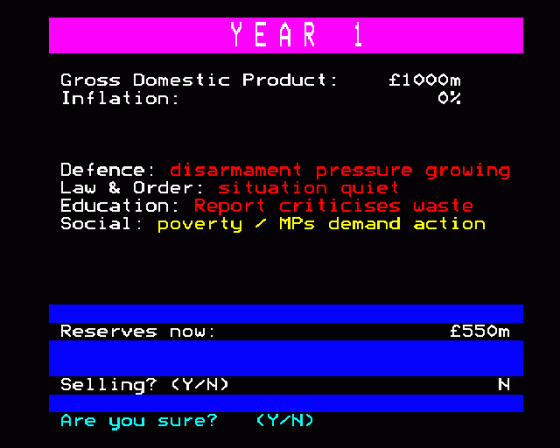
| Genre: | Game |
| Publisher: | Chalksoft |
| Cover Art Language: | English |
| Machine Compatibility: | BBC Model B |
| Release: | Professionally released on 5.25" Disc |
| Available For: | BBC Model B |
| Compatible Emulators: | BeebEm (PC (Windows)) PcBBC (PC (MS-DOS)) Model B Emulator (PC (Windows)) |
| Original Release Date: | 1st March 1986 |
| Original Release Price: | £17.50 |
| Market Valuation: | £6.41 (How Is This Calculated?) |
| Item Weight: | 64g |
| Box Type: | Cassette Single Plastic Clear |
| Author(s): | Tom Tuite |
Variant Items
There are 0 other items featuring this same game (that we know about!). Click any of them for their details.
Active Auctions
Closed Auctions
Buy It
Unfortunately no-one is currently selling this item.
Auction Price Watch
Worried you're being ripped off? Closing prices on eBay can help you decide what a reasonable price is for a particular item.

The Micro User
1st March 1986
Yes Chancellor provides an interesting challenge, as a game. Read Review
Full Instructions
Player's Guide
Have you ever thought you could run things better than the government? Why don't they control inflation, cut taxes, keep interest rates low, spend more on social services, get touch with strikers, meet reasonable wage claims, and so on? Now is your chance to try...
Based on a simplified but in principle *correct* model of the problems of raising and using money - your money - Yes Chancellor is a game about the management of that money - and about politics in a democratic society.
Governments have to be elected. So the object of the game is to stay in power by winning an election every five years - if you last that long. Every year there is a public opinion poll so that you can see how you are doing - and there is some constructive criticism!
Random numbers are used to reflect the uncertainties of the real world. These are kept within the boundaries of probability and all program developments follow general economic laws and are logically tied to your decisions. Success is only possible if you make the kind of responsible decisions necessary in real life.
The program offers four levels of difficulty. Author Tom Tuite - a former Senior Official of the Inland Revenue - recommends that you start on Level 1 so that you can find out how the program works before you are thrown out of office!
Which Office? Why, the Chancellor's, of course. The key to Number 11 Downing Street is yours!
The notes that follow take you through the program step-by-step. Each step is either a *decision* that you have to make, or feedback - in the form of statistics and/or histograms - to help you with the next decision...
Getting Started: Sell Some Of Your Reserves?
The program starts with the opening credits and difficulty options. Choose the level you want, then read the background clues with care and make up your mind what strategy you want to follow.
You start with a Gross Domestic Product (GDP) of 1,000 million (money units) and inflation at 0%. There is also a 'sit-rep' on key areas of the economy - Defence, Law and Order, Education and the Social Services.
The GDP is the total value of what everyone in the country earns and also of what they produce. As national prosperity depends upon the GDP your responsibility is to keep it growing, or at least to stop it falling.
If you succeed, you will find all sorts of things become easier, and you will tend to win votes. Your relations with the Unions may falter, however, since they will want their share of any increased prosperity. Mismanage things and the GDP will shrink and if there is a financial crash you will be forced to resign.
You also start with a substantial reserve fund which exists to help you over difficulties.
You can use it to keep down or repay borrowing, to meet the cost of wage claims and strikes, to give aid to industry or to cover gaps between imports and exports. One obvious use for the Reserves is to boost expenditure in order to 'buy' votes. But be careful. It is advisable to adopt a cautious attitude and use the Reserves only when you can see a clear need. If your Reserves fall below 200 million units you will be penalised. Left alone, the Reserves will tend to grow slowly. Money may also come in from successful aid to industry (see later) or if there is a surplus of exports over imports.
Your first decision is whether or not you are going to sell from Reserves. Follow the on-screen instructions to effect that decision.
The main tax and expenditure sequences now follow. You have to set a rate of tax, decide how much the government is to 'borrow', and how the money is to be spent...
Now Set A Tax Rate
The government imposes a great variety of taxes. For example, the Inland Revenue collects Income Tax, Corporation Tax, Petroleus Revenue Tax, Capital Gains Tax, Capital Transfer Tax (Death duties) and some other taxes; the Customs & Excise collects Customs Duties, VAT, and many different Excise duties; Local Authorities impose local rates; and there are also National Insurance contributions, and some other taxes such as the Motor Vehicle Licence Duty, Dog Licences, etc...
In 1983/84, the approximate figures for government revenue (income) were:
| Government Revenue | Billions |
|---|---|
| Inland Revenue duties | 46 |
| Customs and Excise duties | 31 |
| National Insurance contributions | 22 |
| Other taxes | 4 |
| Local Rates | 14 |
| TOTAL | 117 |
| Add: Public sector borrowing | 10 |
| Less: Interest on government borrowing | 7 |
| Available to spend | 120 |
In this game all taxes and rates are treated as a single (average) figure. You have to decide what this figure is to be, expressed as a percentage of Gross Domestic Product.
Now Decide How Much You Need To Borrow
Your main probem in planning public expenditure to decide how much of the money to raise from taxes and how mch from borrowing. Some of the actual figures just given may help you here, but you will need to experiment.
Spending money wins votes, but raising it loses them! If taxes are too high people object and the national economy suffers. They also take money away from possibly productive uses so that the economy may fail to grow. This could cause problems and lose you votes. An alternative to taxation is to borrow money - but where does the borrowed money come from?
It too is taken from production unless the government just 'prints' more money. In either event the main danger is inflation, that is, money itself becomes increasingly worthless. A little gentle inflation is thought by some to be useful as people see their money income rising and this creates a feeling of confidence. However, you will be in deep trouble if inflation gets out of hand. There have been examples in history when a wheelbarrow full of money would hardly buy a loaf! In Britain in the late 1970's inflation reached 20% and this caused a great deal of worry. So try to find the right balance between taxation and borrowing!
(If your Reserves have grown to such an extent that you feel able to repay borrowing, enter the figure as a negative amount.)
Now Decide How You Are Going To Spend All The Money You Have Raised
Governments spend more money on a great variety of things which, in general, people cannot provide for themselves, such as Education, Defence and Social Security.
For 1983/84 the approximate Public Expenditure breakdown was:
| Expenditure on: | Billions | % of total | % (items 1 to 4) |
|---|---|---|---|
| Defence | 16 | 13 | 23 |
| Law & Order | 5 | 4 | 7 |
| Education | 13 | 11 | 20 |
| Social Services | 35 | 29 | 50 |
| Health | 15 | 13 | |
| Trade, Industry, etc | 10 | 10 | |
| Others | 26 | 22 | |
| TOTALS | 120 | 100 | 100 |
In this game, the first four items above are treated as representative of the whole, and you should divide up your money between them as they appear on the screen. Note the approximate percentage distribution - 23 : 7 : 20 : 50. This is a general clue, but the popularity of particular subjects can vary (for example, during the Falklands War, a section of the public was ready to see defence expenditure increased). Each year, you will be given clues about this and you should adjust your expenditures to allow for this:
clues in red - suggests the subject is unpopular
clues in yellow - suggest it is popular
In general, don't neglect unpopular subjects too much, or go overboard for the popular ones. The public is not stupid and it expects you to run the government responsibly!
In 1983/84 total public expenditure amounted to about 43% of the GDP. Some people think this percentage is too high and that a better figure would be around 40%. In the parameters of this game, using an opening figure of 1,000 (money units) as the start figure for GDP this means about 400 units.
Now Negotiate This Year's Pay Round
The decisions you've taken so far affect the rate of inflation, so you'll be told its latest level after which the public sector unions will submit this year's pay claim.
In Britain the public sector unions all make independent pay claims. In this game, this is treated as a single (average) claim. The Unions usually claim more than they expect to get and no-one (except the Unions) will thank you for conceding each and every claim. The best settlement is usually somewhere between what they expect to get and that which would bring them out on strike - but of course you will not necessarily know the level of the latter.
Good settlements generally attract bonus votes at the next election, while higher settlements incur rebukes and penalties and conceding a claim outright attract severe ones. Whatever you settle for, it is likely to cost you something - the Treasure will advise you on this - so you need to negotiate the lowest possible settlement.
Now Deal With Any Strikes
They have to be settled sometime, but in dealing with any strike you are, essentially, gambling...
You can either try to reach an agreed settlement or attempt to drive the Unions into the ground by insisting upon, or even reducing, your earlier offers. After all, some strikes do collapse - in which case you may escape with a lower cost and a bonus in votes. But, if you take the hard line, remember it is a high risk strategy with, perhaps, escalating costs and progressive loss of votes.
Over the whole game the most likely successful strategy is to negotiate good settlements. Either way there is a cost which is added to your borrowing therefore depressing your chances. The Treasury will update you on the cost of the strikes, and your Party will keep you informed of the potential electoral gains and losses of your anti-strike strategy.
Now Decide The Bank Rate Of Interest
The program computes a commercial rate of interest which is connected to the rate of inflation. Although the rate will apply to government borrowing too, you, as Chancellor, can, of course, vary it if you wish!
This is another very sensitive decision. Usually interest rates have to be higher than the rate of inflation or there is little point in encouraging people to save money! A cut should stimulate the economy at the risk of inflation; a rise should cut inflation but will depress the growth of the GDP. Effects on the foreign exchange rate and the balance of foreign trade as well as on your own borrowing all need taking into account.
The outcome is not entirely predictable because your other decisions are at work too! The skilled player is rewarded by fine tuning. Small changes can help, but bold attempts to disregard economic facts of life will usually result in disaster.
Sometimes You Will Be Asked To Advance Money For Industrial Development
This comes out of your Reserves. You can decide whether or not to advance money, and how much. Industries usually ask the government for money when they can't get it elsewhere - so the loan will be risky. Don't think that this could be an easy way out of your own difficulties; you may just get into deeper trouble! However, it could pay off and make you a good profit and also increase your GDP.
Now The Treasure Reports The Results Of All Your Decisions
The program looks at your decisions and computes their effect on the national economy. In particular, the updated inflation rate is given, together with productive resources reports and the forecast of next year's income.
A growing economy produces security with the possibility of some bonus votes; a contracting economy imposes constraints and penalties with the final possibility of a financial crash and the premature ejection of the 'government'!
Now Consider What You Are Going To Do About Overseas Trade
In its dealings with the outside world, the nation has to earn a living. Everything we buy from abroad (imports) has to be paid for - in the long run - by exports or other foreign currency earnings. If imports exceed exports money will tend to flow out of the Reserves - and vice versa. Alternatively, the value of the national currency measured against foreign currencies (the exchange rate) may be allowed to vary, and this will tend to correct the imbalance. As Chancellor you have to decide whether to let the Reserves or the exchange rate take the strain.
This too is a sensitive decision, because if you let the exchange rate fall the rate of inflation may increasse and there will be knock-on effects elsewhere. On the other hand if ou let the Reserves fail you will lose flexibility in dealing with other problems.
You will find that if your economy is prosperous, it will be far easier to run a trade surplus with possibly beneficial effects on the Reserves. But watch the exchange rate; if it gets too high there may be problems.
How Will You Fare In Public Opinion Polls?
The results of all these decisions are expressed as votes which are reported each year as an Opinion Poll. A histogram is provided to show the results.
Public Accounts Committee Report
This Committee prepares and displays a summary of your progress in all major areas of the economy: inflation, interest, trade, defence, unemployment, etc.
Further histograms supply you with statistical information detailing your GDP history and forecast, inflation record, and your popularity in opinion polls to date.
The program continues through years 2, 3 and 4 of your term until, in year 5, there's a General Election.
Every Five Years There Is A General Election
People are more influenced by what the government does just before an election than what it did several years earlier, though the whole record does count.
So you need to be less worried by unpopularity early in your term of office. It is best at this stage to concentrate on building a healthy, growing economy with a low inflation rate. But don't try cutting taxes too much or you will lose ground without gaining all the advantages you expect.
Just before the election you might try to create a good impression of spending a bit more money. Will you borrow... or use your Reserves?
(Notes: (a) votes are proportioned to the GDP so there is a double benefit to a growing economy; (b) the vote computation is adjusted by the difficulty level selected; (c) if before the election your Reserve Fund has fallen below 200 you are penalised.)
If the government is re-elected play continues into year six and later into year 11. The game ends in year 15 when - if successful - you 'retire with a life peerage'.
Learning About The Economy
You can use the model to try out different strategies - for example, a 'dash for growth' (keep taxes low and finance expenditure more from borrowing).
Or be restrictive: low taxes, low borrowing, low expenditurs. Try these with different policies and interest rates. When you come to deal with the wage claims, try behaving like the 'Iron Chancellor' and never yield anything - if you like playing Russian Roulette! Or play Santa Claus and pay up every time if you are happy to go broke in peace!
Somewhere in all this you may find a successful strategy and produce a buoyant economy with a GDP above the 1,000 million you started with and many years of office for your Party.
To help you see how well you have done, a score is displayed at the end of every election and at the end of the game. This is based on your total number of votes over all the elections, and will help you compare your performance with that of your friends.
Note To Teachers
Please consult the separate 'Hints For Teachers' section which gives guidance on using the program with a class. You will find it useful to explore with students how accurately the program does - and does not - represent the real world. There is as much to be learned from picking holes in the program as from playing the game uncritically!
Teachers' Hints
The variables in this simplified macro-economic model are linked by a set of equations and random numbers which reflect economic principles combined with the unpredictable events of the real world. Teachers may find it useful to explore with students how accurately these do - or do not - represent the real world. There is as much - or more - to be learned from picking holes in the program as from playing the game uncritically!
Brief explanations of particular components of the program are given, followed by points for discussion.
-
Gross Domestic Product
In the program GDP is initially governed by a randomised growth factor which cannot exceed 9% in any one year. High taxation will inhibit this factor on the assumption that 'productive' resources are diverted away from wealth creation.Q. What is economic 'growth'? Why does an economy tend to grow? (Consider different growth rates in different countries.) What can cause a negative growth rate? Is it realistic to treat the government sector as 'non-productive'? (Bring out the long-term productive influences of, for example, Education, Social Services and even Defence Expenditure.) Where do the resources come from to provide all the things that people expect the government to do? (Distinguish between money and wealth.)
-
Government Borrowing
Q. Why do governments borrow money? Who do they borrow it from? Discuss short-term borrowing (Treasury Bills) and long term funding of debt (Gilts, National Savings, etc). How are they represented in the program? What would happen in the game if all outstanding debt had to be repaid? What would happen in the real world? -
Inflation
In the program inflation is controlled by government borrowing, the difference between the 'recommended' interest rate and the 'actual' rate, by variations in the exchange rate, and by some random influences.Q. Are these the only factors which govern inflation? What about wages? (Discuss wages and output.) What about commodity and import costs? (In the 1970's the OPEC oil price rises set off a worldwide inflation.) How does exchange rate influence import and export prices?
Q. In the program the figures are continuously adjusted for inflation. Discuss what this means. How is the value of money measured?
-
Interest Rate
In the game, the 'recommended' rate is randomised up to 4% above the inflation rate.Q. Why is it necessary to pay interest on loans? What influences the commercial rate of interest? What are the effects of interest rates on GDP growth and inflation? Why might high interest rates inhibit GDP growth? Do low interest rates necessarily encourage inflation? (Note that interest is a business and private expense so low rates can pull *against* inflation.) How does one strike a balance? In reality, what power has the Chancellor to play about with interest rates? (Discuss the role of the Bank of England and the influences of foreign interest rates.)
-
Aid To Industry
In the program, this is an occasional option. Actually the government is heavily committed to a wide range of loans and subsidies to industry. Most of the money goes to nationalised industry but such events as the British Leyland and Rolls Royce rescues are well known. Why are such subsidies needed? Who gets them? -
Overseas Trade And Exchange Rates
The program is concerned with the movements of money across the exchanges, of which imports and exports are only a component. The assumption is that a prosperous economy will tend to produce a payments surplus although the program allows considerable scope for 'random' i.e. external influences. Left to itself, the surplus or deficit causes an increase or drop in the reserves. The alternative option is to allow the exchange rate to alter with knock-on effects on inflation and the future balance of payments. -
In the program exchange rate changes are immediately reflected in other changes.
Q. Is this true in reality? (No - discuss time lags and the 'J' curve.) What role do interest rates play in influencing currency exchange rates? What influences outside government affect the volumes of imports and exports (e.g. design, quality, reliability, uniqueness, credit facilities). Is a high exchange rate a good or bad thing?
Public Sector Pay Claims And Strikes
This sequence could be used to initiate a session on industrial relations. The situation represented is deliberately adversarial.
Q. Is this like real life? Is it the right way to do business? What is the alternative? (The arguments are all about pay.) What other matters have to be negotiated? The program shows pay claims as causing additional costs which feed through into inflation. How far is this true? (Discuss productivity.) In the program a lengthy series of strikes is ruinous even if the government 'wins'. Is this always true in the real world?
Political Strategy
As this is a game it is ultimately about winning: so it politics. To enable a player to judge performance a score system is provided. It is suggested that once players are familiar with the principles they should be encouraged to devise a political/economic strategy and to apply it consistently to see wat happens. Were the results in line with expectations? If not, why not? Was the strategy wrong, or can they point to some distortions in the game?
There is more than one potential winning (or losing!) strategy. For example, a low tax, low borrowing, low spending approach in the early years will produce poor results in the opinion polls in those years - when it matters less - but will cause the economy to grow and keep inflation down.
This policy can then be changed before the election by boosting expenditure from reserves or increasing borrowing. But this could go wrong if the government got into a disastrous conflict with the Unions or ran into 'political' unpopularity just before the election. Or the government could keep up GDP growth and its popularity by a free spending strategy based on low taxes and high borrowing. the problem then becomes how to keep inflation from upsetting things.
Whatever strategy is adopted, the main issue is to identify the problems it causes in the game and to attempt to relate these to reality.
Loading
Disc Only: Hold SHIFT and tap BREAK to load
Screen Designers
The following utilities are also available to allow you to edit the supplied screens of this game:
Cheats
Download
A digital version of this item can be downloaded right here at Everygamegoing (All our downloads are in .zip format).
| Download | What It Contains |
|---|---|
| A digital version of Yes Chancellor suitable for BeebEm (PC (Windows)), PcBBC (PC (MS-DOS)), Model B Emulator (PC (Windows)) |
Report A Problem
We thank you from the bottom of our hearts if you report something wrong on our site. It's the only way we can fix any problems!
You are not currently logged in so your report will be anonymous.
Add Note
Release Country
Change the country to update it. Click outside of this pop-up to cancel.
Scan Of Selected Article
If you auction an item, it will no longer show in the regular shop section of the site.





